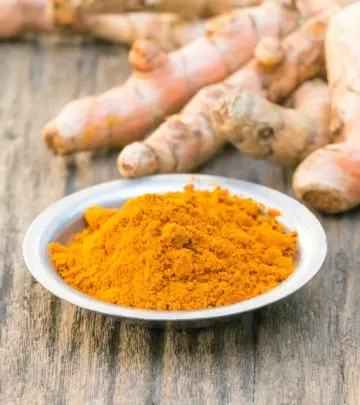
Image: Shutterstock
Turmeric is a spice widely known for its anti-allergic and anti-inflammatory properties. As a result, this spice is sometimes called a superfood. So, if you want to know the benefits of turmeric for children, then this post is for you. When consumed in the right amounts, it can benefit the body. It also has a mild flavor that blends well with most savory dishes. In addition, the yellowish hue makes the food more appealing. With such immense use of this spice, you may want to add it to your child’s diet. Keep reading to know more about turmeric, its benefits, and its side effects.
What Is Turmeric?
Turmeric is a natural herb that is used in food recipes, cosmetics, and antiseptic creams. The herb originated from Indonesia and has been in use since ancient times. It is called Haldi in Hindi and Haridra in Sanskrit. Curcumin supplements are generally safe for adults, but they have not been studied in children under the age of 15, so talk to your pediatrician before giving your child any turmeric-based product.
 Quick fact
Quick factIs Turmeric Safe For Children?
Image: IStock
There are no precise guidelines for when to include turmeric in a child’s food. Yes, turmeric is safe for children. It has several health benefits, and it helps fight many diseases. However, consult your doctor before including turmeric or turmeric-related supplements in your child’s diet. It is always better to seek guidance if you are unsure of the results.
Health Benefits Of Turmeric For Children
Image: IStock
Recent research has found turmeric to broadly act on health systems, supporting a reduction in inflammation, detoxification, and anti-oxidation, which may aid in the treatment of several conditions. Nothing can beat Turmeric when it comes to providing health benefits. Here are some of the disorders where Turmeric works the best for prevention:
1. Alleviates childhood leukemia
Researchers have found that turmeric-rich food reduces the risk of childhood Leukemia to a great extent. Leukemia is the cancer of the white blood cells or the bone marrow. There is an abnormal growth of cells that travel to other body parts and destroy the healthy cells and tissues.
2. Prevents cystic fibrosis
Cystic Fibrosis is a lung disease that can be fatal. A thick layer of mucus accumulates in the lungs and causes severe secondary infections. It sometimes damages the pancreas and hinders the digestion process.
3. Helps to prevents leukaemia
Lifestyle and environmental factors play a major role in the increasing number of Leukemia cases. Turmeric helps alleviate the disease in the following manner:
- It inhibits the mutationiXHeritable changes in the DNA (hereditary material) of an organism that may cause genetic disorders. of the cells, thereby reducing carcinogenicityiXThe ability of a particular substance to cause cancer in an organism. .
- It reduces the multiplication of cancer cells.
- It helps alleviate any damage to the chromosomesiXLong, thread-like structures in the nucleus of a cell that carry an organism's genetic material (DNA). due to the radiation.
4. Helps to provide joint pain relief
- Curcumin’s use has been advocated for cardiovascular health, arthritis, and a host of other conditions for natural pain relief, including the pain arising from joints.
5. Improves cognitive function
- Curcumin improves brain health and acts as a memory booster in people with Alzheimer’s disease.
Curcumin is a substance present in turmeric that gives it its characteristic yellow color. Curcumin reduces the cell mutation that causes cystic fibrosis. Curcumin acts as a natural remedy and is also known to generate an allergy relief response in the immune system and reduce allergies. It also possesses soothing properties as it promotes skin health. However, don’t give your child too much turmeric before speaking to a doctor.
Susan Yara, a mother of two from the US, shares that she uses golden milk (a form of turmeric milk) as a remedy for coughs and colds. She says, “I started to make this golden milk for Nikhash because he is a toddler, and toddlers get sick, but there really aren’t many medicines or remedies out there for these little kiddos. Turmeric is Earth’s natural remedy for colds and coughs and since it is packed with antioxidants it boosts your immune system. It tastes good, I have been giving this to Nikhash, and he loves it. It has been great so far (i).”
 Research finds
Research findsSide Effects Of Turmeric For Children
Image: IStock
Turmeric is a safe herb and does not cause any harm to the body. However, there are certain bodily disorders or conditions where turmeric works in the reverse and aggravates the problem. If your child is suffering from any of the following disorders, then you should not give Turmeric or use it with extreme caution:
1. During surgeries
If your child is about to undergo a surgery, consult your doctor before you give him turmeric. The herb interferes with the body’s ability to clot blood and may hinder the body’s natural process of blood clotting.
2. Gallbladder disorders
If your child is suffering from gallbladder problems, then do not give him turmeric in large quantities as it will worsen the condition.
3. Blood thinning medicines
If your child is on certain medication, then consult your doctor before you give him turmeric. If your child is taking blood-thinning drugs or any anti-platelet medication, then do not give him turmeric at all.
4. Stomach acidity
If your child is suffering from stomach acidity, then the intake of turmeric increases the stomach acid production, so avoid using turmeric. It can also lead to digestive disorders, so it is not good for digestive health.
 Quick fact
Quick fact5. Diabetes
Turmeric herb also affects blood sugar levels. So, do not use it for children who are suffering from diabetes or have issues with blood sugar control.
Frequently Asked Questions
1. How much turmeric can a child take?
The medicinal use of turmeric is not researched for the pediatric population. Therefore, there is no fixed or age-appropriate dose of turmeric for children. You may consult your child’s doctor to know the safe amount of turmeric for children (1).
2. Is turmeric milk safe for kids?
Traditionally, turmeric milk is considered an effective remedy for cough and cold. You can check with your child’s doctor to confirm if it is safe for the child. However, avoid sweetening turmeric milk with added sugar or other artificial sweeteners.
3. Does turmeric make a child sleepy?
Although there are no human-based studies to highlight the sleep-promoting effects of turmeric, recent animal studies have revealed that turmeric aids in better sleep quality (4) (5).
4. Does turmeric increase energy in children?
Turmeric is widely used in Ayurvedic medicine for its supposed health benefits, including increasing energy, eliminating worms, and improving digestion (6). However, be sure to take a piece of medical advice before serving turmeric to your child age-appropriately.
Turmeric is a spice commonly used in limited quantities in many savory dishes. Since there are no specific guidelines about introducing turmeric for children, they can consume it after they’ve begun eating most of the other spices. However, if you wish to administer turmeric supplements to your children, it is advisable to seek a pediatrician’s advice. Turmeric offers many health benefits. However, an excessive intake could cause gastrointestinal disturbances. Hence, if you notice any signs of stomach issues, discontinue turmeric in the diet and consult your pediatrician.
Infographic: Advantages Of Including Turmeric In Children’s Diet
Turmeric, also called Curcuma longa, is a rhizome widely used as a spice in various savory dishes. It is widely known for its antibacterial and anti-inflammatory properties. Scroll through the infographic below to discover the health benefits of turmeric for children.
Illustration: Momjunction Design Team
Key Pointers
- Turmeric can help reduce the risks associated with childhood leukemia, cystic fibrosis, and asthma due to its anti-inflammatory and anti-oxidative potential.
- It is not recommended to give turmeric to children who suffer from gallbladder disorders, stomach acidity, and diabetes.
- If the child is taking blood-thinning medications, it is advised not to use turmeric.
- Before including turmeric or turmeric supplements in your child’s diet, seek advice from a pediatrician.
Image: Stable Diffusion/MomJunction Design Team
Personal Experience: Source
MomJunction articles include first-hand experiences to provide you with better insights through real-life narratives. Here are the sources of personal accounts referenced in this article.
i. Turmeric Milk: My Natural Cold Remedy for Kids and Toddlers!https://www.youtube.com/watch?v=oVZyI72TIUYReferences
- Turmeric
https://www.mountsinai.org/health-library/herb/turmeric - Curcumin.
https://lpi.oregonstate.edu/mic/dietary-factors/phytochemicals/curcumin - Gabriel Manarin et al.; (2019); Curcuma longa L. ameliorates asthma control in children and adolescents: A randomized double-blind controlled trial.
https://pubmed.ncbi.nlm.nih.gov/30991137/ - Min Young Um et al., Curcuminoids, a major turmeric component, have a sleep-enhancing effect by targeting the histamine H1 receptor
https://pubs.rsc.org/en/content/articlelanding/2022/FO/D2FO02087D - Min Young Um et al., (2021); A Novel Potent Sleep-Promoting Effect of Turmeric: Turmeric Increases Non-Rapid Eye Movement Sleep in Mice Via Histamine H1 Receptor Blockade.
https://pubmed.ncbi.nlm.nih.gov/34003596/#:~:text=Conclusion%3A%20TE%20has%20a%20sleep,could%20be%20useful%20in%20insomnia - Prasad S and Aggarwal BB; Turmeric, the Golden Spice From Traditional Medicine to Modern Medicine.
https://www.ncbi.nlm.nih.gov/books/NBK92752/





















